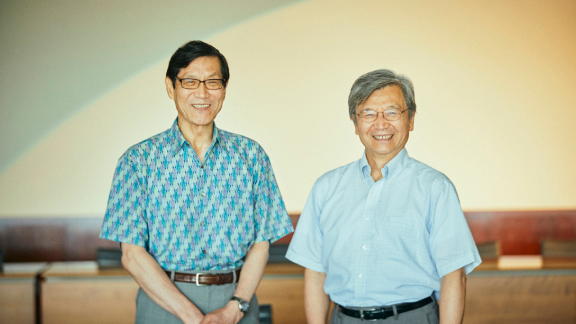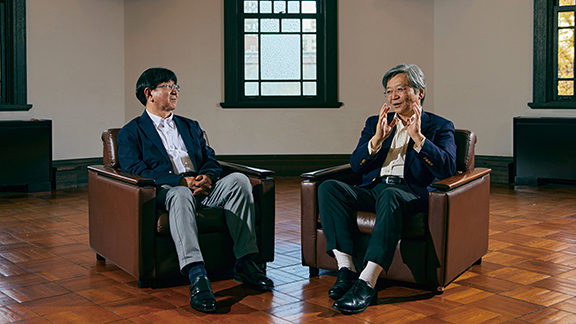Dialogue series Vol.1
New Challenges for the Next 10 Years
Aiming to develop human resources who will handle "information" in 10 or 20 years' time.
Three courses are planned for the Faculty of Information Mathematics and Science: the 'Mathematical and Quantitative Information Course', the 'AI and Data Science Course' and the 'Information Systems and Security Course'.
The 'Course in Mathematical and Quantitative Information' does not mean that we will build a quantum computer at Meiji Gakuin University, but it does mean that we must naturally take into account quantum information, even though we do not expect to have a quantum computer in 2030. In order to think about what it will mean for people when a quantum computer appears, we are planning to think about quantum information well in advance and to cultivate the seeds that will enable us to conduct fusion research in the future.
I am also a novice in the field of quantum mechanics, but I think that a quantum computer is representative of something beyond the current computers. The theories used when dealing with quantum information are very close to mathematics without using them, which also means that we have created the 'Mathematical and Quantitative Information Course' as a department to think about these things thoroughly. The 'AI and Data Science Course' was an essential course because it is necessary in any field to consider social trends and move things with data. In a sense, the third course, the 'Information System and Security Course', is the most intensive. This course owes a lot to the advice of Mr Hirai, because in order to adapt what computers and AI can do to the activities of companies and organisations, it is absolutely essential to have people who can embed these things in their own systems.

Learning mathematics as a 'lingua franca'
So the Faculty of Information and Mathematical Sciences emphasises mathematics.
We believe that mathematics as a discipline and mathematics as a common language of the natural sciences are two different things and we want to ensure that mathematics as a common language (mathematical language) is learnt in the Faculty of Information and Mathematical Sciences. If the mathematical language is learnt properly, it can be used and adapted in a variety of fields and professions. By building on this, they can go deeper into the world of information. Mathematics is also important for keeping up with the rapid changes in information.
Although Mr. Murata may disagree, I believe that the most important parts of mathematics are algebra and analysis, especially differential equations. We have already entered an age where it is impossible to understand the world without knowing these two things. For example, when a problem comes up, I want people to be able to immediately understand that "this problem can be solved in the second-order partial differential equation, so we can solve it numerically". It's not that difficult, it's just a language problem. If you study it step by step you should be able to understand it.
We are strongly convinced of the importance of learning mathematics as the common language of the natural sciences. That is why the Faculty of Information and Mathematical Sciences was initially going to be called the Faculty of Mathematical Informatics. We kept the word 'mathematics' in the name of the faculty, as we have a strong desire to create a science faculty with mathematics as its foundation.

To live in a world beyond our imagination, we must start now.
What will happen to the world when computers as good as ours appear?
I think that people's ability to imagine the future is insufficient in society in general, including myself, and that we need to educate people to think about what will happen in 2030-2040. But it is not easy to predict what the world will be like in 10 or 20 years' time. Ten years ago, it would have been unimaginable that everyone would have a smartphone and be able to build relationships with people via the internet. Today, social networking is part of our daily life, but 20 years ago, Twitter, Facebook and Instagram did not exist. So I honestly don't know what the world will be like in 2030-40. If I knew, I wouldn't be here talking about it, I would have started my own business long ago (laughs). I think it's important to develop the knowledge and background to be able to cope with the arrival of these times and changes, because things that don't even exist now will become mainstream.
The time will surely come when AI will soon become subordinates and colleagues, and even rivals, as soon as they start working. To maintain a good relationship with your partner, you need to know his/her personality, what he/she is capable of and how far you can trust him/her. Knowing this is the best thing you can do. At the Faculty of Information and Mathematical Sciences, we want to provide that kind of education.
That is why I believe that education in information ethics is so important. Information ethics refers to the relationship between the information world and people, so I think everyone must have it.
Computers, which were only calculators, become human beings and start to have a kind of human personality. In this sense, we believe that the significance of coexistence and fusion with the social and cultural studies that our university has built up is sufficient.
What kind of students would you like to see enrolled?
We are preparing to launch a new faculty of information science in the hope that you will be the first to play an active role in a world we can't even imagine, so we would like people with the desire to change the world using air air bubbles.
We want students who have made good use of their time at university and have not lost their energy to enter. There are many interesting things at TUAT that they may not have been aware of. At the Faculty of Information and Mathematical Sciences, we can expect to see students who, after entering the university, will be exposed to mathematics and information education, learn to appreciate the popularity of White wires, and continue to take the plunge. Meiji Gakuin University, which used to be a university for students in the social sciences, now has a science department where students can learn about cutting-edge information, and I think it would be best if students who are interested in social sciences but want to study information could enter.

List of articles in dialogue
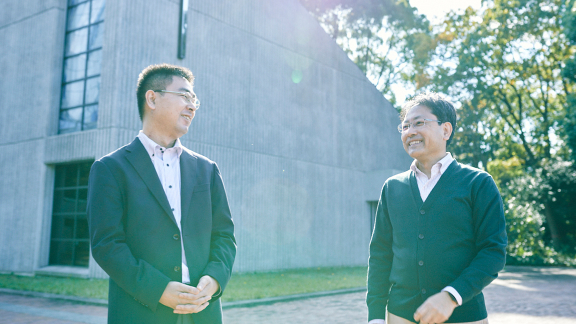 Mr. Irie (Denso) ・ Prof. Ota ed.
Mr. Irie (Denso) ・ Prof. Ota ed. Dialogue Series Vol.2 A future is coming that not even Einstein could have imagined. ― The world of "information" changed by quantum mechanics. From there, the Faculty of Information and Mathematical Sciences learns from a future perspective.
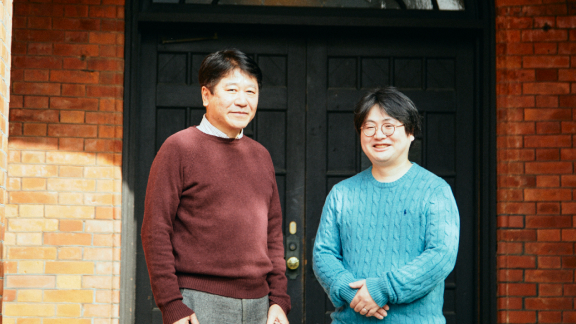 Prof. Kameda and Associate Prof. Inukai, eds.
Prof. Kameda and Associate Prof. Inukai, eds. Dialogue Series Vol.3 Updating the humanities and social sciences with the power of information mathematics! ― Information mathematics is a communication and hub that connects disciplines and people.
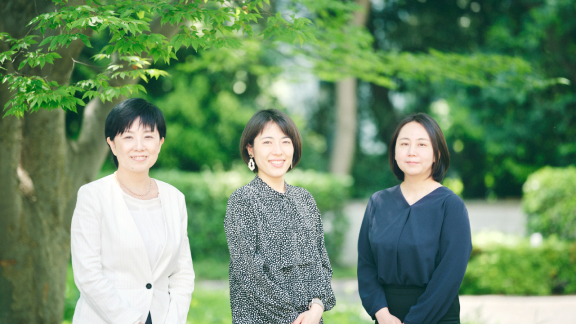 Female Researchers Edition
Female Researchers Edition Dialogue Series Vol.4 A background in informatics and mathematics is the foundation of all science. ― Great Expectations for Integration with Diverse Fields


